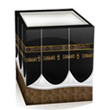The Ruling Concerning Al-Isbal in Clothing
- Details
- Category: Sheikh Otheimin
- Published on Tuesday, 12 November 2013 11:33
- Hits: 922
The Ruling Concerning Al-Isbal in Clothing
The Noble Scholar Muhammad As-Saalih Al-'Uthaymeen said:
If someone lets his Izar (waist wrap) drop lower than his ankles from vanity or haughtiness, then Allaah Almighty will neither look at him on the Day of Judgement, nor speak to him, nor purify him; and for him is a painful punishment. If he does so, but not from haughtiness, then his punishment will be the fire on whatever is below his ankles. This is because the Prophet (sallAllaahu `alayhi wa sallam) said,
ËáÇËÉ áÇ íßáãåã Çááå íæã ÇáÞíÇãÉ æáÇ íäÙÑ Åáíåã æáÇ íÒßíåã æáåã ÚÐÇÈ Ãáíã ÞÇá ÝÞÑÃåÇ ÑÓæá Çááå Õáì Çááå Úáíå æÓáã ËáÇË ãÑÇÑ ÞÇá ÃÈæ ÐÑ ÎÇÈæÇ æÎÓÑæÇ ãä åã íÇ ÑÓæá Çááå ÞÇá ÇáãÓÈá æÇáãäÇä æÇáãäÝÞ ÓáÚÊå ÈÇáÍáÝ ÇáßÇÐÈ
"There are three people that Allaah will not speak to on the Day of Judgement, will not look at them, will not purify them; and for them is a painful punishment: one who lets his garment hang below his ankles, the Mannan and the Munffiq who does his business with false oaths." (Muslim no. 106)
And because he (sallAllaahu `alayhi wa sallam) said,
ãä ÌÑ ËæÈå ãä ÇáÎíáÇÁ áã íäÙÑ Çááå Åáíå íæã ÇáÞíÇãÉ
"Whoever drags his garment out of arrogance, Allaah will not look at him on the Day of Judgement." (Al-Bukhari no. 5784 and Muslim no. 2085)
These address one who drags his garment out of arrogance. As for the one whose objective is not arrogance, in Sahih Al-Bukhari it is recorded that Abu Hurayrah, may Allaah be pleased with him reported that the Prophet (sallAllaahu `alayhi wa sallam) said:
ãÇ ÃÓÝá ãä ÇáßÚÈíä ãä ÇáÅÒÇÑ ÝÝí ÇáäÇÑ
"Whatever is below the ankles is in the fire." (Al-Bukhari no. 5787)
The Prophet (sallAllaahu `alayhi wa sallam) did not confine this to arrogance, and it is not correct to do so based on Hadeeth before it because Abu Sa'id Al-Khudri, may Allaah be pleased with him, said that the Messenger of Allaah (sallAllaahu `alayhi wa sallam) said,
ÅÒÑÉ ÇáãÓáã Åáì äÕÝ ÇáÓÇÞ æáÇ ÍÑÌ Ãæ áÇ ÌäÇÍ ÝíãÇ Èíäå æÈíä ÇáßÚÈíä ãÇ ßÇä ÃÓÝá ãä ÇáßÚÈíä Ýåæ Ýí ÇáäÇÑ ãä ÌÑ ÅÒÇÑå ÈØÑÇ áã íäÙÑ Çááå Åáíå
"The Izar of the believer is at the middle of his shin, and there is no harm - or he said - no sin upon someone if it is anywhere between that and the ankles. What is lower than that is in the Fire. And whoever drags his Izar arrogantly, Allaah will not look at him on the Day of Judgement." (Abu Dawud no. 4093, Ibn Majah no. 3573, An-Nasa'i 5/490, no 9716 and Al-Mawatta' 2/914, 915)
Because the two actions are different, the punishment for each is different. Whenever the ruling and the reason for that differ, it is not possible to restrict a general ruling, this is because that would lead to a contradiction.
As for those who use Abu Bakr's Hadeeth to argue the contrary, we say that there is no proof in that because of two reasons:
1. Abu Bakr, may Allaah be pleased with him, said that one side of his garment would fall down if he didn't constantly hold it up to make sure it didn't. In his case, may Allaah be pleased with him, he did not let his garments fall out of arrogance but it would fall even though he was trying to keep it up. We say to those who let their garment hang low, claiming that they do not intend to do so out of arrogance, but still do so on purpose, that by them letting their garments hang below their ankles on purpose even without arrogance, only what is below their ankles will be punished in the Fire. And if they do so out of arrogance, they will be punished with what is worse than that: Allaah will not speak to them on the day of Resurrection, nor look at them, nor purify them, and they will receive a painful punishment.
2. The Prophet (sallAllaahu `alayhi wa sallam) attested and witnessed to the fact that Abu Bakr, may Allaah be pleased with him, did not do so from haughtiness. Does any of these people have this commendation or witness? Rather the Shaytan has enticed some people to follow texts that are not so clear to them in the Qur'aan and Sunnah, thus making an excuse for their actions. Allaah guides whomever he pleases to the straight path, so we ask Allaah to guide all of us to it.
Shaykh Muhammad bin Saalih al-`Uthaymeen
Fatawa Islamiyah, Vol. 7, Pages 365-367, DARUSSALAM





















